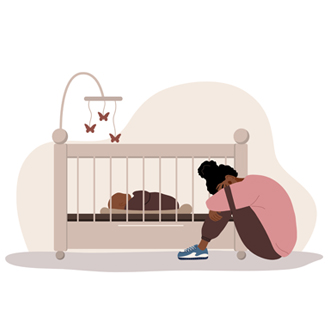
This article includes discussion of postpartum depression that may be challenging for some readers.
April 24, 2024
By Amberly Ray, Drexel University College of Medicine
Depression is a serious and potentially life-threatening illness that affects more than 19 million adults in the U.S. each year.1 Women are twice as likely as men to develop depression.1 When people use the word “depression,” they are most often referring to major depressive disorder (MDD). Major depressive disorder is diagnosed when someone experiences at least five of the following symptoms over a two-week period, with at least one of the symptoms being depressed mood or anhedonia: depressed mood, anhedonia (loss of interest or pleasure in things), fatigue, feelings of worthlessness or hopelessness, guilt, decreased concentration, thoughts of death or suicide, insomnia or hypersomnia, decreased or increased appetite, and psychomotor agitation or retardation.2
Pregnant women are at risk of developing another type of depression called postpartum depression (PPD). The symptoms for postpartum depression and major depressive disorder are the same, with the exception that postpartum depression develops within a year of giving birth or within the last trimester of pregnancy.2
Until recently, the treatment for postpartum depression and major depressive disorder was the same: starting an antidepressant drug (also known as selective serotonin reuptake inhibitors or SSRIs, which work by increasing the levels of serotonin in the brain). Although SSRIs can be incredibly helpful for treating depression, they can take several weeks before they start working. In August of 2023, the FDA approved zuranolone as the first oral medication indicated to treat postpartum depression.3 This drug acts like allopregnanolone, which is a form of progesterone that is naturally produced in the body and helps improve symptoms of anxiety and depression.4 This drug works similarly to brexanolone, a different drug for postpartum depression that is only available through a 60-hour IV infusion over 2.5 days.5 There is an obvious benefit of taking a pill versus a multiple-day infusion. Additionally, the research that led to this drug’s approval is very impressive.
In two randomized, double-blind, placebo-controlled studies (AKA the gold standard for research studies), patients in the zuranolone groups showed significant improvement in their depressive symptoms compared to the placebo group.6 Symptom improvement was noticed in as early as three days of treatment!6 This finding is groundbreaking, especially compared to the several weeks it can take for symptom improvement with SSRI treatment.
The recommended dose of zuranolone is 50 mg, taken in the evening with a fatty meal for 14 days.6 The dosage may be adjusted depending on the patient’s liver and kidney function.6 This drug can be used alone or in combination with SSRIs.6 Patients should use contraception for three weeks once starting this medication.6 Side effects of the medication include drowsiness, dizziness, fatigue, diarrhea, cold-like symptoms and urinary tract infections.6 This drug should not be taken with alcohol, benzodiazepines, opioids or tricyclic antidepressants, as this combination can increase central nervous system depressant effects (i.e., drowsiness).6
The current out-of-pocket cost for the entire 14-day course of this medication is $15,900.7 Since this is a new medication, it will take time for insurance companies to determine coverage. It is also possible that more affordable generic versions will be made available in the future. Until more affordable options are available, a copay assistance program that allows patients to have little to no copay is available.8
Drexel's Employee Assistance Program is available to help employees in need of support through confidential, 24/7 counseling at 888.628.4824. This is offered at no cost to benefits-eligible faculty and professional staff, their family members, and Drexel graduate students. More information is available on the Human Resources website. Students can reach out for support via Student Wellbeing.
Sources/Resources:
- Depression In Women. Mental Health America. https://mhanational.org/depression-women#3
- American Psychiatric Association. Diagnostic and Statistical Manual of Mental Disorders. 5th ed. Washington D.C.: 2013
- National Center for Biotechnology Information. PubChem Compound Summary for CID 86294073, Zuranolone. https://pubchem.ncbi.nlm.nih.gov/compound/Zuranolone
- Payne JL, Maguire J. Pathophysiological mechanisms implicated in postpartum depression. Front Neuroendocrinol. 2019;52:165-180. doi:10.1016/j.yfrne.2018.12.001
- Edinoff AN, Odisho AS, Lewis K, et al. Brexanolone, a GABAA Modulator, in the Treatment of Postpartum Depression in Adults: A Comprehensive Review. Front Psychiatry. 2021;12:699740. Published 2021 Sep 14. doi:10.3389/fpsyt.2021.699740
- Moore Simas TA, Hoffman MC, Roussos-Ross K, Miller ES, Gandhi M, Shields A. Zuranolone for the Treatment of Postpartum Depression. ACOG Clinical - Practice Advisory. 2023. https://www.acog.org/clinical/clinical-guidance/practice-advisory/articles/2023/08/zuranolone-for-the-treatment-of-postpartum-depression
- Howard J. First postpartum depression pill now available in the US, drugmakers say. CNN Health. December 15, 2023. https://www.cnn.com/2023/12/14/health/postpartum-depression-pill-zurzuvae/index.html
- ZURZUVAE Savings Card Program Terms and Conditions. https://www.zurzuvae.com/content/dam/commercial/psych/zura/pat/en-us/pdf/zurzuvae-savings-card-terms-and-conditions.pdf